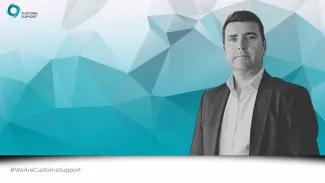Who are you?
I’m Stephan Hoffert, and I’ve been working for Customs Support for just over one year.
My background is in international sales, which I have worked in since 1998. Throughout my career, I have worked in several sectors: communication, office supplies, security and now in the customs industry. My focus has always been new business development.
You are the business development director for France. What does that mean?
My main task now is to grow the business. This includes creating more partnerships with new clients, but there is another side to it. I also need to create visibility of Customs Support in France, consult with key accounts, present the group and manage all of our existing clients.
The second objective that I have is to build the sales team in France, set up all the sales process and implemented the Customs Support Group tools.
What does your typical working day look like?
I split my week in two so that I can focus on my tasks better. On Mondays and Fridays, I am concentrated on my admin work, following up on revenue and organising follow-ups based on the different data tools we use – such as Salesforce.
From Tuesday to Thursday I am contacting customers and meeting with prospective clients.
It’s not always that black and white, and of course I have meetings internally every day, but that is how I organise my time.
What do you like the most about your job?
What I like the most is to be in contact with various kinds of people. You cannot enjoy this job without liking the people element of it. I get to meet people and see businesses of all shapes and sizes whilst working in customs, and I love it.
Meeting people face-to-face is better than online, but I appreciate that Teams and other virtual meeting platforms are a big win. France is a big country, and I cannot travel all hours of the day to meet people; it would not be efficient.
But sometimes I need to visit a different office, of which we have nine in France, and I like to link those with visiting our customers and prospects in the area. The opportunity to see businesses in all sectors up close is great, and no two are the same.
You’re based in Paris’ Charles De Gaulle Airport area. What do you like about being there?
France is a central country and Paris, of course, is the capital. In terms of business, this area is the biggest for customs and trade flow, so it is the place to be. The region is also nice, and there is a lot to do here.
What do you like the most about being part of a Europe-wide network?
Many things. As I said, I have always worked in international business, and it’s nice to practise languages, discover unfamiliar cultures, and find out new ways of working.
Professionally, I find it interesting to work within an international customs group. We work in individual cells as countries, since every country has its own rules, but then we also work as an international team and share the same customers over those territories.
So what's the next stage of development for France?
The aim is to grow more. Last year, we focused on getting our foundations right, implementing new data tools, CRMs, and procedures that will help us to build.
Now, our task is to build the visibility of Customs Support in France. It is not so widely adopted in France to use an independent supplier of customs, like it is in other parts of Europe, so it’s important for us to let businesses know how we add value and why it is worth switching to us.
What is the objection to independent customs providers in France?
Most businesses use their freight forwarders to do their customs work, or have an internal team. Although it makes sense to keep things under the same roof, the problem is that customs is treated like a step in the freight journey and isn’t prioritised.
Therefore, what we see is that the people doing the declarations are not specialists, they just know how to get the custom clearance done so that they can honour their delivery slot. We will take the time to make sure their clearances are processed correctly and that the are protected from noncompliance should they ever be audited.
The other value that we add is in strategic customs consultation. We are specialists and can do it all: food, ITEC, temporary, import, export, bonded and more. An internal or freight-based customs team is limited in their knowledge and can usually only provide a basic solution when there could be an alternative that saves the trader time and money.
What is the most important thing that someone should look for when they're choosing a customs broker?
If you are an international company, then it is important to have someone who can help on both sides of the border and help you to manage that flow. Using a single point of contact, you can quickly resolve issues and facilitate a solution before it becomes a costly problem.
The second thing is to have a provider who is moving towards digitalisation, although this does tie into the first point. Digital customs makes things faster and keeps your declarations accurate, which of course helps your compliance and to minimise the risk of problems. End-to-end digital customs clearance is better for everyone involved as the control and the compliance are there.
Sales and business development are very energy intensive with meeting lots of people. What do you outside of work to relax and unwind?
I like traveling. I like to enjoy time with friends. And I am into sports, doing cross-fit, tennis, and golf.
You work with a Europe-wide network, if you were to visit a country of Customs Support, where would you go and why?
I’d like to go to Spain. I like Spain and I lived two years in Mexico. I need to practice my Spanish some more and I really like Madrid because there's a lot of historic things.














